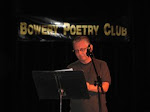Now playing on Bodega Pop on WFMU's Give the Drummer Radio: Hits, homages, deep cuts, covers, early 78s, deconstructions, and legendary performances by the world's greatest living singer
 Birdstriking
Birdstriking 
 The Yellow Dogs Upper Class Complexity
The Yellow Dogs Upper Class Complexity  Sharliza Jelita
Sharliza Jelita  Melhem Zein
Melhem Zein  MC HotDog
MC HotDog  Abou el Leef
Abou el Leef  Pussy Riot
Pussy Riot Lonely Friday
Lonely Friday